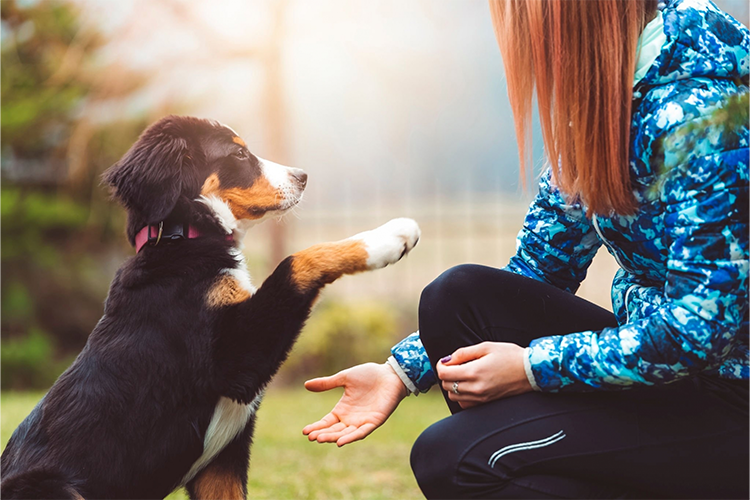The Ultimate Overview to Dog Training: Structure a Happy, Loyal Family Pet
Reliable canine training is a complex procedure that pivots on a deep understanding of canine actions and the application of tried and tested methods. By accepting favorable reinforcement and constant command usage, animal owners can grow not just obedience but also a solid, trusting relationship with their pets.

Comprehending Canine Actions
Just how does a dog's habits mirror its mental and emotional state? A pet's actions can serve as a home window into its feelings, requirements, and total psychological wellness.
Body movement also plays a critical function in recognizing canine behavior. A loosened up posture and open mouth signal comfort, whereas strained muscular tissues and pinned ears might suggest stress and anxiety or aggressiveness. Observing these signals is essential for determining the root creates of a dog's behavior, whether it comes from enjoyment, concern, or stress.
Additionally, a canine's interaction with its environment and various other animals can offer understanding right into its emotional state. As an example, a pet dog that involves playfully with various other pets is most likely feeling safe and social, while one that displays avoidance or aggressiveness might be experiencing stress or insecurity. Understanding these behavior signs is crucial for promoting a solid connection between the pet dog and the owner, ultimately adding to the canine's emotional wellness and wellness.
Vital Training Strategies
Reliable canine training techniques are essential for cultivating desirable actions and strengthening the bond in between a pet and its proprietor. Utilizing favorable reinforcement is just one of the most reliable methods, where incentives such as treats, appreciation, or play are offered to reinforce desired actions (dog training charlotte). This motivates the pet to repeat those actions, creating a positive understanding atmosphere
Consistency is an additional crucial component in dog training. Commands must be clear and consistent, and all relative must apply the exact same policies to avoid puzzling the pet dog. Timing is just as important; benefits should be offered quickly after the desired habits to develop a clear connection in between the action and the benefit.
Furthermore, short and engaging training sessions work, as pet dogs have differing interest spans. Go for sessions of 5 to 15 minutes, depending upon the pet dog's age and power degree. Including play into training can likewise improve inspiration and satisfaction for both the pet and the owner.
Finally, persistence is critical. Pets learn at their very own speed, and preserving a tranquil temperament will certainly help minimize stress, ensuring a favorable training experience. These vital strategies prepared for effective pet dog training and a harmonious connection.
Fundamental Commands to Educate

Usage treats, praise, and playtime to award your pet's successes. By instilling these basic commands, owners equip their canines with the abilities needed for a well-behaved and unified connection.
Resolving Typical Behavioral Problems
Comprehending and resolving usual behavioral issues in dogs is vital for fostering an unified relationship in between pets and their owners. Numerous dogs exhibit behaviors such as too much barking, chewing, or aggression, which can originate from stress and anxiety, boredom, or lack of correct training. Determining the root reason of these behaviors is the very first step toward reliable intervention.
For instance, extreme barking might show a need for focus or a feedback to environmental stimuli. In such instances, owners need to analyze the canine's environment and offer appropriate mental stimulation, such as interactive toys or normal workout. Chewing can frequently be taken care of by rerouting the habits to proper chew things and making sure that the pet dog has enough exercise to decrease boredom.
Hostile behavior calls for cautious handling and may necessitate specialist training support. It's important to recognize that penalty can worsen stress and anxiety and hostility, leading to a cycle of behavioral concerns. Instead, concentrate on positive support methods to award preferable behaviors and enhance a sense of protection.
Structure a Positive Training Atmosphere
Developing a favorable training environment is essential for strengthening desirable article source actions in canines and reducing behavior problems. This atmosphere ought to be characterized by consistency, encouragement, and a clear understanding of the training purposes. By developing a routine, dogs learn what is expected of them, which helps in reducing anxiousness and confusion.
Utilizing favorable support techniques, such as treats, appreciation, and play, promotes a sense of safety and inspiration in the canine. Rewarding good behavior immediately and regularly enhances the wanted actions, making the training procedure much more reliable - dog training near me. In addition, trainers should continue to be person and calmness, as dogs are sensitive to their trainers' emotions
The training area need more helpful hints to be without distractions to ensure the pet can focus on the tasks handy. Consider utilizing a silent area or a safe outside area. Integrating play and socialization into training sessions advertises a well-rounded technique, improving the canine's understanding experience.
Ultimately, a positive training setting supports a strong bond between the pet and handler, leading to a loyal, happy family pet. By prioritizing this atmosphere, pet dog owners can effectively address behavioral obstacles and grow a successful training journey.
Final Thought
Effective pet training depends on a thorough understanding of canine actions and the application of favorable support strategies. Adopting these concepts ensures a rewarding training experience for both pet dogs and their proprietors.
Reliable dog training is a multifaceted procedure that hinges on a deep understanding of canine actions and the application of proven methods. A pet that engages happily with other dogs is likely sensation safe and social, while one that obedience class for dogs near me displays evasion or aggressiveness may be experiencing stress and anxiety or instability.Efficient dog training techniques are important for fostering desirable behaviors and enhancing the bond between a pet and its owner.Developing a positive training atmosphere is basic for reinforcing desirable actions in pet dogs and mitigating behavioral problems.Reliable dog training relies on a thorough understanding of canine actions and the application of favorable support strategies.